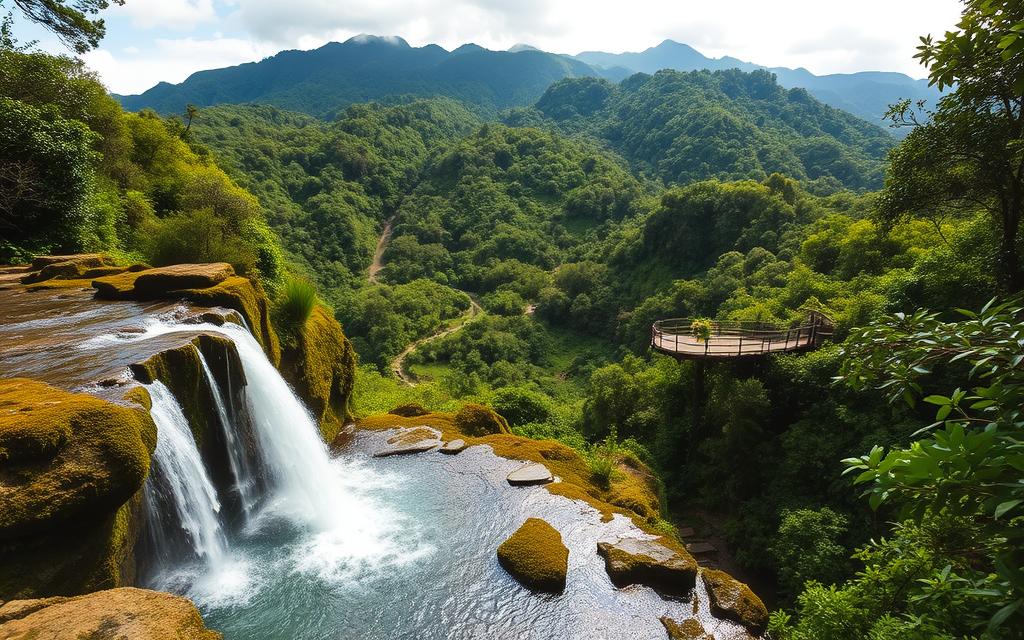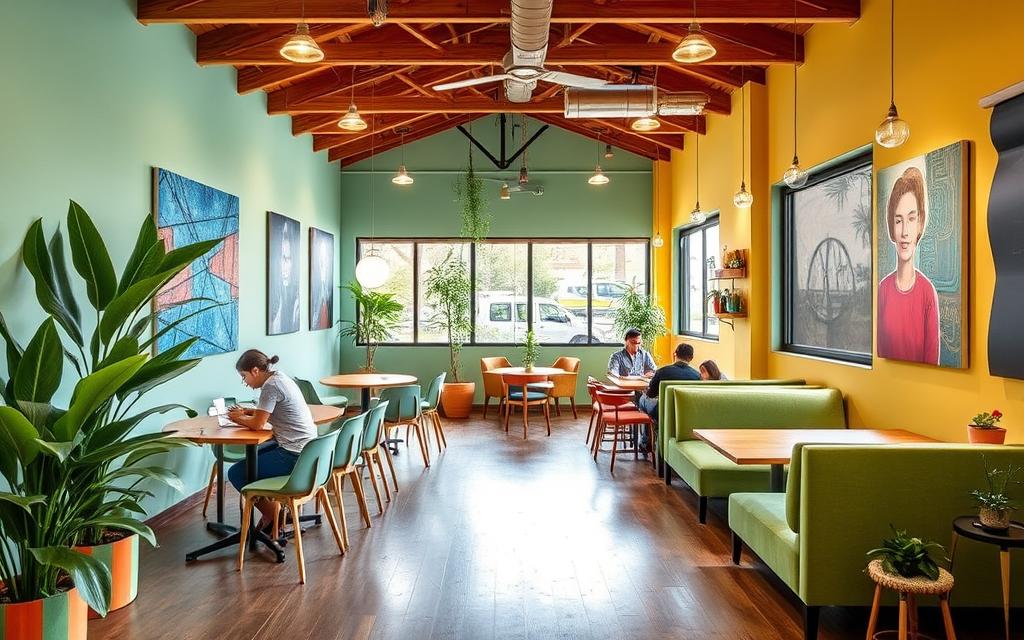Can you work remotely in Costa Rica with residency? Requirements

Costa Rica has emerged as a hotspot for digital nomads, with its stunning landscapes and rich biodiversity making it an attractive destination. Over 10,000 digital nomads have already made the move, drawn by the country's welcoming environment and vibrant culture.
As a remote worker considering Costa Rica for your next adventure, understanding the residency requirements is crucial. The country's digital nomad visa allows professionals to live and work here for up to two years, offering a unique lifestyle that combines work and leisure.
We will explore the comprehensive requirements and processes for obtaining residency, highlighting the necessary steps from visa options to practical considerations for a smooth transition.
Understanding Costa Rica's Appeal for Remote Workers

Costa Rica has emerged as a top destination for remote workers, drawn by its unique blend of natural beauty and modern amenities. The country's focus on sustainability and eco-friendly living adds significant value for professionals who prioritize environmental consciousness.
Natural Beauty and Quality of Life
Costa Rica's rich biodiversity and varied landscapes, from lush rainforests to pristine beaches, create an inspiring environment for remote workers. The relaxed pace of life in Costa Rica allows for a better work-life balance, enabling professionals to stay productive while enjoying the benefits of living in a tropical paradise. The Costa Rican culture, known for its warmth and hospitality, further enhances the quality of life for expats and digital nomads.
Political Stability and Infrastructure
Costa Rica stands out for its exceptional political stability, being Central America's oldest democracy since 1949, with no standing army and consistently peaceful transitions of power. This stability creates a secure environment for foreign residents. The country's infrastructure has seen significant improvements, particularly in urban centers and popular beach towns, with expanded fiber optic networks providing average internet speeds of 50-200 Mbps.
The healthcare system in Costa Rica is noteworthy, ranking higher than the United States in WHO assessments, with universal coverage for residents and high-quality private options. Additionally, the banking system is modern and accessible, with major institutions offering English-language services and digital banking platforms, facilitating easy access to financial services for remote workers.
Overview of Costa Rica Residency Options

The pursuit of residency in Costa Rica can be navigated through several distinct categories, each designed to accommodate different lifestyles and financial situations. Costa Rica offers a variety of residency options to suit the needs and circumstances of applicants.
Temporary Residency Categories
Costa Rica provides several temporary residency categories, including the Rentista Visa, which is designed for individuals with a stable monthly income of $2,500 or a $60,000 deposit in a local bank. Another option is the Investor Visa, requiring a minimum investment of $150,000 in real estate, business ventures, or securities. This path is ideal for individuals looking to contribute to the country's economy while securing their residency.
The Retirement Visa, or Pensionado, is available for retirees with a lifetime monthly pension of at least $1,000, providing access to the country's healthcare system and other benefits.
Permanent Residency Pathways
Permanent residency in Costa Rica typically becomes available after maintaining temporary residency status for three consecutive years, although this period is reduced to two years for citizens of Spain and certain Latin American countries. The First Degree Family Connection option allows immediate relatives of Costa Rican citizens to apply directly for permanent residency.
Permanent residency offers significant advantages, including indefinite stay without renewals, the ability to work legally for Costa Rican employers, and a simplified path to eventual citizenship after seven years. Applicants must provide proof of temporary residency compliance, tax compliance certificates, and evidence of integration into Costa Rican society.
The Digital Nomad Visa Program

With its Digital Nomad Visa, Costa Rica is redefining the concept of a workcation, offering a blend of productivity and paradise. This visa program is specifically designed for remote workers, allowing them to live and work in Costa Rica for an extended period.
Program Benefits and Limitations
The Digital Nomad Visa offers several benefits, including the ability to stay in Costa Rica for up to one year, with the option to renew. However, there are certain limitations and requirements that applicants must meet, such as proving a minimum income and having valid health insurance.
One of the key benefits is the opportunity to experience Costa Rica's rich culture and natural beauty while continuing to work remotely. However, it's essential to understand the visa's limitations, including the requirement to spend at least 80 consecutive days in Costa Rica during the previous year to be eligible for renewal.
Duration and Renewal Options
The initial duration of the Digital Nomad Visa is one year, with the possibility of renewing for another year. To renew, applicants must initiate the process 60-90 days before the expiration of the initial visa period, providing updated proof of income and valid health insurance coverage.
After the maximum two-year period, visa holders have options to transition to other residency categories, such as Rentista or Inversionista, or they must leave Costa Rica for at least 90 days before reapplying. The renewal application costs approximately $90 and typically processes within 2-4 weeks.
Understanding the duration and renewal options is crucial for digital nomads planning their stay in Costa Rica. By knowing the requirements and process, individuals can better plan their long-term stay and make informed decisions about their residency.
Can You Work Remotely in Costa Rica with Residency?

As remote work becomes increasingly popular, many are considering Costa Rica as their next destination. The country's appeal lies in its unique blend of natural beauty, political stability, and modern infrastructure, making it an attractive hub for digital nomads and remote professionals. But can you work remotely in Costa Rica with residency? The answer lies in understanding the legal framework and restrictions associated with different types of residency visas.
Legal Framework for Remote Work
Costa Rica's legal framework supports foreign nationals in working remotely while enjoying the benefits of residency. Programs like the Digital Nomad Visa exempt individuals from local taxes on foreign income, making it an attractive destination for remote professionals worldwide. This visa category is specifically designed for individuals who work for foreign companies or operate their own businesses outside of Costa Rica.
The legal framework allows for various types of residency, each with its own set of permissions and restrictions regarding work and business operations within Costa Rica.
Restrictions and Permissions
The specific work restrictions and permissions vary significantly across different residency categories. For instance, holders of the Digital Nomad Visa are not allowed to work for Costa Rican companies but can operate their foreign businesses from within the country. Similarly, Rentista and Pensionado visa holders face restrictions against local employment but can own businesses in Costa Rica, albeit with certain limitations on their involvement in day-to-day operations.
In contrast, Permanent Residents and Investor visa holders have broader work permissions, including the ability to be employed by local companies or operate businesses that serve the Costa Rican market. The permission to hire staff also varies by visa type; for example, Digital Nomad Visa holders can hire domestic help but are restricted from employing staff for their business operations within Costa Rica, whereas Investor visa holders can employ local staff.
Understanding these restrictions is crucial to avoid legal implications such as visa revocation, fines, and potential difficulties with future immigration applications.
Income Requirements for Different Residency Types

When considering residency in Costa Rica, understanding the income requirements is crucial for a smooth transition. Costa Rica offers various residency options, each with its own financial prerequisites.
Digital Nomad Visa Income Thresholds
The Digital Nomad Visa in Costa Rica comes with specific income requirements. Applicants must demonstrate a stable monthly income that meets the threshold set by the government. This ensures that digital nomads can support themselves while living in the country.
While the exact figure may be subject to change, understanding the current requirement is vital for planning. The Digital Nomad Visa is designed to attract remote workers who can contribute to the local economy without seeking local employment.
Other Residency Categories Income Requirements
Beyond the Digital Nomad Visa, other residency categories have their own income requirements. For instance, the Rentista Visa requires a monthly income of $2,500 or a $60,000 deposit in a local bank. The Pensionado Visa, designed for retirees, necessitates a lifetime monthly pension of at least $1,000.
The Inversionista Visa, aimed at investors, demands a minimum investment of $150,000 in approved sectors such as real estate or export businesses. Each category's income or investment requirement must be maintained throughout the residency period and verified during renewal applications.
Understanding these requirements is key to choosing the right residency path in Costa Rica. By meeting the specified income thresholds, applicants can ensure a successful residency application.
Tax Implications for Remote Workers in Costa Rica

As remote workers consider Costa Rica for their next destination, understanding the tax implications is crucial for financial planning. Costa Rica has become a haven for digital nomads and remote professionals due to its lush landscapes, stable economy, and welcoming environment.
Tax Exemptions for Digital Nomads
Costa Rica's Digital Nomad Visa program offers attractive tax exemptions, making it an appealing choice for remote workers. Individuals holding this visa are exempt from local taxes on foreign income, including income tax and import tax on their work equipment, provided their income originates from outside Costa Rica. This exemption is a significant incentive for digital nomads, allowing them to maintain their financial stability while enjoying the benefits of living in Costa Rica.
The territorial taxation system in Costa Rica applies to most residency categories, meaning that only income generated within the country is subject to local taxation. This system simplifies tax obligations for digital nomads, as their foreign-earned income remains untaxed.
Tax Obligations for Other Residency Types
While Digital Nomads enjoy explicit tax exemptions, other residency categories have different tax obligations. For instance, Rentista and Pensionado visa holders must pay Costa Rican income tax on any locally-generated income, although their foreign-source income generally remains untaxed. Business owners with Inversionista visas face more complex tax obligations, including corporate income tax at a rate of 30%, sales tax at 13%, and employer contributions if they hire local staff.
Permanent residents are subject to the same tax obligations as Costa Rican citizens on income earned within the country. Their foreign-source income typically remains outside Costa Rica's tax jurisdiction. It's essential for all residency types to comply with tax regulations, as tax delinquency can affect visa renewals and applications for permanent residency or citizenship.
In conclusion, understanding the tax implications is vital for remote workers considering Costa Rica as their base. By grasping the tax exemptions and obligations associated with different residency types, individuals can make informed decisions about their financial planning and ensure compliance with Costa Rican tax laws.
Health Insurance Requirements
When applying for residency in Costa Rica, understanding the health insurance requirements is crucial. Costa Rica mandates that residency applicants have valid health insurance that meets specific minimum coverage requirements.
Minimum Coverage Requirements
The minimum coverage requirements for health insurance in Costa Rica include coverage for medical expenses, hospitalization, and repatriation. The insurance policy must be valid for at least one year and cover the applicant for a minimum of $50,000 in medical expenses.
To comply with these requirements, applicants can choose from various international and local insurance providers. For more information on health insurance options for digital nomads in Costa Rica, visit our related article
Recommended Insurance Providers
Popular insurance options among digital nomads include Safety Wing Nomad Insurance, Cigna Global, IMG Global, and Blue Cross Blue Shield International. Local Costa Rican insurance providers like Instituto Nacional de Seguros (INS) often offer more affordable coverage that perfectly meets the visa requirements, with premiums typically 20-40% lower than international providers.
When selecting an insurance provider, consider factors such as claim processes, English-language support, and coverage networks within Costa Rica. For long-term residents, enrolling in the Caja Costarricense de Seguro Social (CCSS) public healthcare system may be an option.
Step-by-Step Application Process
To successfully apply for residency in Costa Rica, follow our step-by-step guide, which outlines the necessary documents and procedures. The process is designed to be efficient, with two convenient submission methods available: online through the Digital Nomad Visa Portal or in-person at the immigration office in San José.
Document Preparation and Authentication
Before submitting your application, it's crucial to prepare and authenticate the required documents. This includes gathering original documents, making copies, and authenticating them as necessary. The specific documents required may vary depending on your residency category, but generally include a valid passport, proof of income, health insurance, and background check.
We recommend verifying the exact requirements for your specific residency category to ensure you have all necessary documents. Once your documents are prepared, you can proceed to the submission stage.
Submission and Processing Timeline
The application fee structure for residency in Costa Rica includes a $100 application fee, $90 approval fee, and $20 for the DIMEX residency card. All fees must be paid through the Banco de Costa Rica using specific payment codes. The processing timeline typically involves 2-4 weeks for initial review, 4-8 weeks for background verification and approval, followed by a biometrics appointment and DIMEX card issuance, which takes an additional 1-2 weeks.
After approval, applicants must complete several post-approval steps, including registering with the CCSS (Costa Rican Social Security) and obtaining the DIMEX card. We will guide you through these steps and provide strategies for tracking your application status and addressing any processing delays.
By understanding the application process and required documents, you can ensure a smooth and successful residency application in Costa Rica. Whether you choose to apply online or in-person, following these steps will help you navigate the process with confidence.
Common Challenges and How to Overcome Them
Despite its many attractions, Costa Rica's residency application process is not without its difficulties. Applicants often face challenges that can delay their application.
Documentation Issues
One of the primary challenges is documentation issues. Incomplete documentation, such as missing translations or apostilles, can significantly delay the processing of your application. To avoid this, ensure that all required documents are complete and properly authenticated before submission. For detailed information on the required documents, you can visit this resource on obtaining a digital nomad visa in Costa Rica.
Processing Delays
Processing delays are another common challenge. The average processing time for a residency application in Costa Rica is typically between 4 to 8 weeks. However, during peak seasons, such as January to March, the high volume of applications can extend this period to 3-4 months. To minimize delays, consider submitting your application during lower-volume periods. Additionally, using legal assistance services can help ensure that your application is processed as efficiently as possible.
For those already in Costa Rica on a tourist visa, it's essential to plan ahead for visa extensions or border runs if necessary, to maintain legal status while your application is being processed.
Best Locations for Remote Workers in Costa Rica

When considering Costa Rica as a remote work destination, the choice of location can significantly impact your lifestyle and productivity. Costa Rica offers a diverse range of environments that cater to different preferences and needs.
Urban Centers: San José and Central Valley
For those who prefer urban living, San José and the Central Valley offer a blend of cultural experiences, modern amenities, and reliable internet. San José, the capital city, provides access to a wide range of services, including coworking spaces and high-speed internet. The Central Valley, with towns like Escazú and Santa Ana, offers a more suburban lifestyle with easy access to the capital.
Coastal Areas and Emerging Digital Nomad Hubs
Coastal areas are increasingly popular among digital nomads. Tamarindo, on the Pacific coast, is known for its well-developed infrastructure and vibrant expat community. Santa Teresa, also on the Pacific coast, offers a more laid-back atmosphere with a growing digital nomad scene, though internet connectivity can be challenging at times. Puerto Viejo, on the Caribbean coast, provides a unique cultural experience with its Afro-Caribbean influence and is becoming increasingly popular among remote workers.
These coastal areas typically offer internet speeds ranging from 20-80 Mbps, with fiber expanding to major beach towns. While coworking options are fewer compared to urban centers, many "workation" hostels provide a conducive work environment. The cost of living in these areas is generally higher, ranging from $1,600 to $2,500 per month for equivalent comfort, compared to the Central Valley. For more information on the tax implications for digital nomads in Costa Rica, visit Understanding Tax Implications for Digital Nomads.
Internet Reliability and Coworking Spaces

With its lush landscapes and modern amenities, Costa Rica is an ideal destination for digital nomads seeking productive work environments. The country's appeal lies in its balance of natural beauty and infrastructure that supports remote work. As more digital nomads choose Costa Rica, the demand for reliable internet and quality coworking spaces continues to grow.
Internet Infrastructure by Region
Costa Rica's internet infrastructure varies by region, with urban areas generally offering more reliable and faster connections. In cities like San José and Escazú, digital nomads can expect high-speed internet, often above 100 Mbps. Coastal areas are also improving, with many popular destinations now offering reliable internet, although speeds can be more variable.
Popular Coworking Options
Coworking spaces are on the rise in Costa Rica, catering to the growing community of digital nomads. In San José, spaces like Selina, WeWork Escazu Village, and Iguana offer modern amenities and high-speed internet, with memberships ranging from $100 to $250 monthly. Coastal areas are also seeing an expansion in coworking options, with notable spaces in Tamarindo, Santa Teresa, and Puerto Viejo offering daily passes and monthly memberships.
For those on a budget, coffee shops with good Wi-Fi are common in urban areas, typically requiring a minimum purchase of $5-10 daily. Additionally, coliving spaces are becoming increasingly popular, offering all-inclusive packages ($800-1,500 monthly) that include accommodation, workspace, and community events, making them an attractive option for digital nomads.
Banking and Financial Considerations
As you prepare to relocate to Costa Rica, understanding the banking and financial landscape is crucial for a smooth transition. Costa Rica's banking system is well-developed and offers various options for foreigners, including remote workers and digital nomads.
Opening Local Bank Accounts
Opening a local bank account in Costa Rica can simplify your financial management and help you integrate into the local economy. To open an account, you'll typically need to provide identification, proof of address, and proof of income. Some banks may also require a minimum initial deposit. For digital nomads, it's worth exploring banks that offer online account opening options and low fees. You can find more information on the best banks for digital nomads in Costa Rica.
Money Transfer and Currency Exchange
When transferring money to Costa Rica, you have several options, including traditional bank wires, specialized services like Wise and Revolut, and cryptocurrency transfers. While bank wires are secure, they often come with higher fees. Specialized services can offer better exchange rates and lower fees. It's also essential to understand the local currency, the Costa Rican colón (CRC), and how it fluctuates against the USD. Maintaining accounts in both USD and CRC can provide maximum flexibility for your financial transactions.
Managing finances across multiple currencies requires careful planning. Using apps to track exchange rates and timing large transfers can help you take advantage of favorable rates. Additionally, maintaining emergency funds in both your home currency and CRC can provide a safety net.
Finding Accommodation as a Remote Worker

As remote workers consider Costa Rica for their next destination, finding the right accommodation becomes a top priority. Costa Rica offers a diverse range of living options, from urban apartments in San José to beachside villas in Tamarindo.
Short-term vs. Long-term Rentals
When it comes to renting in Costa Rica, remote workers must decide between short-term and long-term rentals. Short-term rentals offer flexibility, allowing you to explore different areas before committing to a longer lease. However, they can be more expensive and may lack the amenities you need for a productive remote work lifestyle.
Long-term rentals, on the other hand, provide stability and often come with better rates. They are ideal for those who have decided on a specific location and are looking to settle in for an extended period.
Transportation Options for Residents
Costa Rica offers a variety of transportation methods for residents, from public transit to personal vehicle rentals and purchases. Understanding these options is essential for navigating the country efficiently.
Public Transportation Network
Costa Rica's public transportation network is extensive, with buses connecting major towns and cities. The bus system is reliable and affordable, making it a popular choice for many residents. However, the frequency and coverage can be limited in more rural areas.
Vehicle Rental and Purchase Considerations
For residents who prefer more flexibility, vehicle rental or purchase is a viable option. Long-term car rentals are available at rates between $400-600 monthly, offering discounts compared to tourist rates. For coastal and mountain areas, 4WD vehicles are recommended, especially during the rainy season. Alternatively, scooter or motorcycle rentals ($200-300 monthly) are cost-effective for shorter distances, particularly in beach communities.
For stays over six months, purchasing a vehicle might be more economical. As a resident, you'll need to comply with documentation requirements, including having a DIMEX card. Financing options are available, but be aware that import taxes can increase the overall cost, making vehicles generally 20-40% more expensive than in the US.
We recommend exploring vehicle insurance options, including mandatory basic coverage (SOA) and comprehensive coverage. Residency status can affect insurance rates, so it's worth comparing providers to find the best option for your needs.
For more information on residency and its implications, you can visit this resource to understand the differences between work permits and residency in Costa Rica.
Professional Immigration Assistance Services

As a digital nomad considering Costa Rica, leveraging professional immigration assistance can simplify your residency journey. Our clients' journeys to residency in Costa Rica are filled with inspiring stories of success. Over the years, we've helped countless individuals navigate the complexities of immigration, turning their dreams into reality.
Benefits of Using Immigration Experts
Immigration experts can provide valuable guidance on the visa application process, ensuring that you comply with all requirements and regulations. By choosing a reputable service provider like Jaros CR (www.jaroscr.com, info@jaroscr.com, +(506)7182-8969), you can benefit from their expertise in handling various residency pathways, including the digital nomad visa.
The benefits include personalized consultations to evaluate your specific situation, transparent pricing structures, and clear explanations of what's included in their services. This tailored approach helps in making informed decisions about your residency application.
Choosing the Right Service Provider
When selecting an immigration service provider, there are several criteria to consider. These include verifying their legal certification, checking client testimonials, assessing their experience with your specific visa category, and evaluating their communication responsiveness.
Be cautious of red flags such as unrealistic promises, significantly lower fees than market rates, reluctance to provide references, and pressure tactics. A reputable firm will offer comprehensive services tailored to different residency pathways and maintain clear communication throughout the process.
Conclusion: Is Costa Rica Right for Your Remote Work Lifestyle?
For those considering a remote work lifestyle, Costa Rica presents a compelling opportunity to balance work and life in a stunning environment. Living in Costa Rica offers a blend of modern convenience and natural beauty, making it a top choice for professionals. The country's commitment to sustainability and high-quality living attracts individuals from around the globe.
Costa Rica offers a unique combination of natural beauty, political stability, and growing digital infrastructure that creates an ideal environment for remote workers seeking work-life balance and connection with nature. We've explored the comprehensive requirements and benefits of working remotely in Costa Rica with residency, from the Digital Nomad Visa's tax advantages to the quality of life benefits that make this country a top destination for location-independent professionals.
The country provides multiple pathways to residency based on your circumstances and goals, whether you're seeking a temporary digital nomad experience, planning for retirement, or considering a permanent relocation. While the application process requires careful preparation and patience, the rewards of legally living and working in Costa Rica—with its high-quality healthcare, diverse communities, and outdoor lifestyle—make the effort worthwhile for thousands of digital professionals.
To determine if Costa Rica aligns with your remote work goals, we encourage you to assess your specific needs, income stability, and lifestyle preferences. For personalized assistance with your Costa Rica residency journey, you can contact immigration experts at Jaros CR (www.jaroscr.com, info@jaroscr.com, +(506)7182-8969) who can guide you through every step of the process.
In conclusion, Costa Rica is an attractive destination for remote workers due to its various residency options, high quality of life, and natural beauty. By understanding the requirements and benefits of working remotely in Costa Rica, you can make an informed decision about whether this tropical paradise is right for you.


